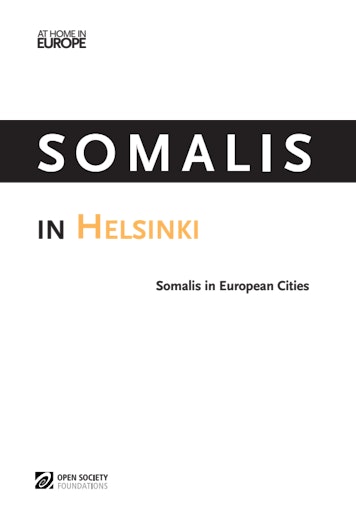Somali Life in Helsinki
By Marja Tiilikainen
About five percent of Finland’s 5.4 million people have foreign roots, and most of these persons live in greater Helsinki, the capital city. The first of Finland’s people with roots in the African country of Somalia began arriving in the 1990s as asylum seekers, giving the traditionally Lutheran Finns their first experience with a significant number of predominantly brown-skinned, Muslim people seeking refuge from a war-torn land. About 15,000 or so Somalis now comprise Finland’s third-largest immigrant ethnic group. Finns have referred to their landing as the “Somali shock.”
The report Somalis in Helsinki examines the lives of people from Somali backgrounds in Helsinki. The research examines issues like identity and belonging for Somalis in Helsinki as well as their day to day interactions in areas like employment, health care, political participation and education. While Somalis in Helsinki value the health services, security and social protection offered by the city, it remains that employment difficulties, including failure to find a job and discrimination in daily life, are damaging Somalis’ sense of belonging in Helsinki.
Somalis’ impressions of their daily lives in Helsinki vary significantly by individual and by gender and generation. Some Somalis praise the quiet, secure environment in Finland, especially in comparison with the lawlessness they left behind in Somalia. Other Somalis in Finland indicate that they are struggling with isolation and unemployment. The Somalis’ grassroots organizations, although active, remain fragmented.
A 2009 survey by the European Union’s Fundamental Rights Agency on European Minorities and Discrimination concluded that the Somali minority in Finland numbered among the European immigrant and ethnic minority groups that had most experienced discrimination. Somali minority respondents in a number of studies in Finland reported harassment and discrimination on the streets, in shops, and by some police officers, exacerbating their sense of isolation and insecurity.
Somali participants in this research expressed a clear consensus that some people in Finland have strong negative attitudes toward Somalis, which contributes to the Somalis’ sense of isolation and exclusion from the wider society. Focus group participants described a range of interactions with Finns, which were usually respectful but restrained.
These interactions include several successful community development initiatives, which have helped to build sustained, meaningful contact between the Somali and majority community. "In my view, 80 percent [of the Finns accept us],” one elderly Somali man told a focus group. “If they didn’t accept us, we wouldn’t be here. If it were just one percent [accepting us], we would not be sitting here today, we’d be running from here.”
The sense of belonging is also a two-way process. An elderly woman participant said she had not even once allowed herself to consider herself a part of her neighborhood: “This is because I miss my country. I live here. I am well here. And I have security here. Yet I have this feeling that I want to leave this place, this feeling that this land is not my land, that I am an outsider here, really, we are outsiders in this country.”
Participants pointed out that immigrants themselves should take a more active role in obtaining their rights.
“In regard to their rights, they may not understand them, or make an effort to get them,” one participant said. “[People] should understand that they also have rights as citizens and not remain in the immigrant box. They should lift themselves, even if the society is not organized and encouraging people.
We have lived here more than 20 year … but we lack people of knowledge, journalists, lawyers. We don’t have people who argue for our rights, even if we are dead, no one will speak for us, and if we live no one can speak for us, be it an NGO, or a community group, or a lawyer … we as a community have a problem, because we don’t have lawyers to defend our rights. We don’t have professionals who can advise us on our problems; men or women who can do something about the issues. We have problems in schools, we have problems everywhere. That’s why the Finns treat us like this. We are like dead prey that doesn’t have anyone standing up for their rights.”
An old man concluded: “All my neighbours know me, and they greet me, and we talk with each other. Even the elderly men like to talk with me when outside. It is necessity that has brought us here, to live among people who have a culture different from ours and [a] religion different from ours. We must abandon the strict adherence to our own culture, and I don’t mean religion here. We must be very patient. There are good people here and also bad people. I believe that if we are patient with them, we will get results. There are many opportunities if we look for them, there are also difficulties but they can be managed.”
One of the recommendations of the report is that the city of Helsinki and state agencies raise awareness on the issue of belonging, the changing ethnic landscape of Finnish society and the multiplicity of identities that are emerging in Finland. Finland is well past its “Somali shock” moment; now it is time to build on Helsinki’s positive steps to help those who have made Finland their home.
Somalis in Helsinki is published by the At Home in Europe project of the Open Society Foundations.
Marja Tiilikainen is an Academy Research Fellow at the University of Helsinki, Department of Social Research.
